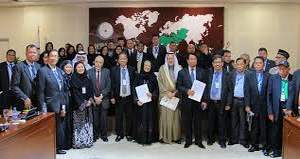FROM THE WEBSITE OF OPPAP
Solons resume public hearings in Mindanao; first stop Tawi-Tawi and Zamboanga City
“We join the efforts of Congress to hear the people’s sentiments and ensure that their concerns are addressed in the BBL,” said Undersecretary Jose Lorena of the Office of the Presidential Adviser on the Peace Process, referring to the scheduled local public hearings of the House of Representatives’ Ad Hoc Committee on the BBL. Today’s hearing in Tawi-Tawi will be followed by another consultation in Zamboanga City tomorrow, Nov. 14. They will likewise be holding public hearings in Jolo, Sulu on November 19; Isabela City, Basilan on November 20; and Ipil, Zamboanga Sibugay on November 21.
“We encourage our people in these areas to attend and make their sentiments heard,” Lorena said. “Our lawmakers want to ensure that the BBL that will be crafted will be as inclusive as possible and responsive to the needs of the people.”
Cagayan de Oro second district Rep. Rufus Rodriguez, chairman of the Ad Hoc Committee on the BBL, will preside the said local public hearings. Meanwhile, Lorena, together with Atty. Al-Amin Julkipli, are invited by the Ad Hoc Committee as resource persons from OPAPP.
Local concerns in Tawi-Tawi
In Tawi-Tawi, more than 100 resource persons have been invited to the public hearing. Gov. Nurbert Sahali, Vice Governor Michael Ahaja, lone district Rep. Rubi Sahali, local board members, mayors, other local executives, government officials, local and religious leaders, civil society members and MNLF leaders are expected to attend.
“I believe Congress will really appreciate the presence of as many Tawi-Tawians as possible in the hearing so they can hear their questions, concerns, and the things that they like in the proposed Bangsamoro Law,” said Lorena.
Lorena noted that the island province of Tawi-Tawi has MNLF members in the communities. He said that among the issues he anticipates to be raised in the consultations include concerns of the MNLF on the 1996 Final Peace Agreement (FPA); possible redistricting of Tawi-Tawi when it becomes part of the Bangsamoro; tenure of employees in ARMM when it is replaced by Bangsamoro; and the possible effects of establishing the Bangsamoro waters.
“We want to assure the MNLF communities in Tawi-Tawi that the future Bangsamoro will be for them also as well as other stakeholders in the proposed area of Bangsamoro,” he said.
In previous interviews and fora, members of the government and Moro Islamic Liberation Front (MILF) peace panels have assured that MNLF concerns, especially the 42 consensus points that are the result of the Tripartite Review Process of the implementation of the 1996 FPA have been integrated in the draft BBL.
At the same time, through the facilitation of the Organization of Islamic Cooperation (OIC), the MILF and MNLF have formally activated the Bangsamoro Coordination Forum (BCF). According to their meeting report, the BCF shall serve to “coordinate their movements toward achieving the aspiration of the Bangsamoro people towards just and lasting peace, and peaceful resolution of their problems.”
Local concerns in Zamboanga City
In Zamboanga City, nearly 300 resource persons are expected to attend the hearing which includes local government officials led by Mayor Maria Isabelle “Beng” Climaco Salazar, Zamboanga City 1st district Representative Celso Lobregat and Zamboanga City 2nd district Representative Lilia Nuno, barangay officials, other government executives, sectoral leaders and representatives, business groups, civil society members and other groups.
Lorena said he expects a big-turn out of stakeholders attending the hearing on Friday “in the city where the people have strong opinions and concerns with regard to the proposed BBL.”
“I think that this will make for interesting public consultations. We expect to hear about issues such as the non-inclusion of Zamboanga peninsula to Bangsamoro area, the definition of contiguity, and effects of Bangsamoro waters and Bangsamoro police, among others.”
Lorena said public hearings on the BBL “is an avenue for clarification, so the more issues and comments that will be voiced out, the better for Congress to enable them to pass the best law for the Bangsamoro that will be constitutional and acceptable to all concerned.”
Asked to comment on rumors of possible demonstrations and walk-outs that may be staged at the hearing, Lorena said that he hasn’t heard anything about such rumors. “You know, this is a free country, and everyone is entitled the freedom to express ourselves. But of course, in deference also to the freedom of others, any demonstrations should be done peacefully and with due respect to all other participants in the consultation.”
Responses to top local concerns
According to the Comprehensive Agreement on the Bangsamoro and the BBL, also known as House Bill 4994 in the HOR, Zamboanga City is not part of the envisioned core territory of the Bangsamoro.
In a previous hearing, Government of the Philippines peace panel chair Miriam Coronel-Ferrer affirmed that, “as we have learned through our experience with the MOA-AD (Memorandum of Agreement on Ancestral Domain), the intentions and interests of some provinces and cities that voted against inclusion — such as Zamboanga City — were duly respected, so they were not included in the proposed core territory of the Bangsamoro.” Coronel-Ferrer likewise noted that the principle of consent of the governed is likewise given importance in the proposed BBL.
On the Bangsamoro Waters, Lorena has clarified that commercial fishing operators will be allowed to operate within the Bangsamoro Waters, that shall extend up to 22.224 kilometers (12 nautical miles) from the low-water mark of the coasts that are part of the proposed Bangsamoro region. According to Lorena, the Bangsamoro Waters, being part of the country’s territorial waters, shall remain to be a resource for all Filipinos, with preferential rights given to the Bangsamoro people, other indigenous peoples in adjoining provinces and resident fishers in the Bangsamoro area over fishery, aquamarine, and other living resources in the Zones of Joint Cooperation as provided for in the Constitution.
The BBL is the legal iteration of the CAB signed by the GPH and MILF as the final political settlement of the armed conflict in the south. The BBL will entrench the Bangsamoro political entity that will replace the Autonomous Region in Muslim Mindanao by 2016.
The current hearings being conducted by the HOR are prior to the plenary deliberations on the proposed law. The Senate is likewise conducting its own separate consultations led by the Committees on Local Government and Peace, Unification, and Reconciliation chaired by Senator Ferdinand “Bongbong” Marcos, Jr. and Senator Teofisto “TG” Guingona III. The Senate has conducted its first public consultation in Western Mindanao, in the province of Tawi-Tawi on Nov. 11.
OPPAP Website
links:
OTHER HUMAN RIGHTS PROMOTIONS WEBSITES
PROTECTION AND PROMOTION OF HUMAN RIGHTS
————————————————————————
—————————————————-
—————————–
—————————————————-
—————————–
















0 comments:
Post a Comment